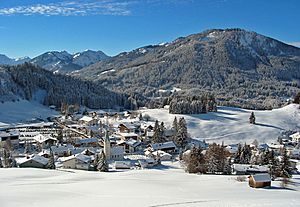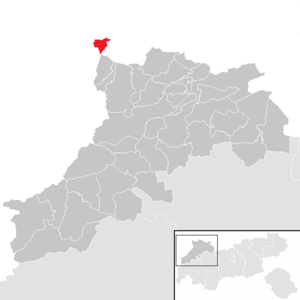Jungholz facts for kids
Quick facts for kids
Jungholz
|
||
|---|---|---|
 |
||
|
||
|
.
Location of Jungholz within Tyrol
|
||
| Country | Austria | |
| State | Tyrol | |
| District | Reutte | |
| Area | ||
| • Total | 7.06 km2 (2.73 sq mi) | |
| Elevation | 1,054 m (3,458 ft) | |
| Time zone | UTC+1 (CET) | |
| • Summer (DST) | UTC+2 (CEST) | |
| Postal code | ||
| Area code | 05676 | |
| Vehicle registration | RE | |
Jungholz is a small village in Tyrol, Austria. It's a very special place because you can only reach it by driving through Germany! There are no roads connecting Jungholz directly to the rest of Austria.
Because of this unique situation, Jungholz used to be part of Germany's customs area. This meant that goods moving in and out of Jungholz followed German rules, not Austrian ones. Also, before 2002, Jungholz used the German currency, the Deutsche Mark, instead of the Austrian schilling. When the euro was introduced, both countries started using it. Today, you can even send mail to Jungholz using either a German or an Austrian postal code.
Contents
Where Four Borders Meet: The Sorgschrofen Peak
Jungholz is connected to the rest of Austria by just one tiny spot: the top of a mountain called Sorgschrofen. This mountain peak is 1,636 meters (about 5,367 feet) high.
This single point is very important because it's where four different borders meet. Imagine a cross shape on the map! This special meeting point is called a quadripoint.
Four Municipalities at One Point
At the top of Sorgschrofen, borders from four different areas come together. These areas are:
- Jungholz (Austrian, to the north)
- Pfronten (German, to the east)
- Schattwald (Austrian, to the south)
- Bad Hindelang (German, to the west)
So, two Austrian areas and two German areas all touch at this one mountain peak!
A Look Back: Jungholz's History
Jungholz has an interesting history, especially concerning its borders.
Early Days and Ownership
The story of Jungholz goes back to June 24, 1342. On this day, a farmer named Hermann Häselin from Wertach, Germany, sold the land where Jungholz now stands. He sold it to Heinz Lochpyler, who was an Austrian tax collector from nearby Tannheim. Heinz Lochpyler then made sure this new land became part of his other properties in Tyrol, Austria.
Border Agreements and Customs Union
Many years later, in 1844, Austria and Bavaria (a state in Germany) signed a border treaty. This treaty officially confirmed that Jungholz belonged to Austria.
Later, in 1868, a special agreement was made. This agreement created a customs union between Jungholz and Germany. This meant that even though Jungholz was part of Austria, it was treated like it was part of Germany for trade and customs purposes. This was because it was so hard to get to Jungholz from the rest of Austria.
World War II Changes
During World War II, in 1938, Germany took control of Austria. At this time, Jungholz, along with another isolated Austrian area called Kleinwalsertal, was added to a German region called Gau Swabia in Bavaria. However, after the war ended, Jungholz was returned to Austria.
See also
 In Spanish: Jungholz para niños
In Spanish: Jungholz para niños
 | May Edward Chinn |
 | Rebecca Cole |
 | Alexa Canady |
 | Dorothy Lavinia Brown |




